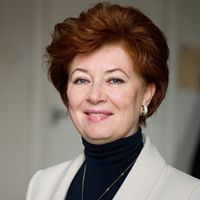From ambition to action: building Europe’s Defence Union
Past event In person

- Area of Expertise
- Peace, Security & Defence
Peace, Security & Defence

Professor of Regional and European integration studies at the University of Latvia (LU)
Latvia’s first stint in the European Union’s rotating presidency offers an opportunity to influence the EU agenda, and Latvia’s priorities include reinforcing the Union’s external role. The country’s President, Andris Berziņš, has underlined the importance of supporting economic development and good governance in all the Eastern Partnership countries. The Eastern Partnership has so far yielded somewhat mixed results, and at times has been a disappointment, however its next summit will take place in Riga in May, and that is expected to see in-depth discussions on the need to rethink it.
Latvia’s geographical location, place in geopolitics and historical memory make Latvia to be a strong contributor to the EU’s involvement in reforming of the Ukrainian economy and society. When Latvia’s foreign minister Edgars Rinkēvičs visited Russia in January of this year he emphasised that his aim was to “try to find new ways of engaging in discussions on the Eastern Partnership and dissipate some stereotypes, as we definitely do not see our presidency as something that sometimes is called anti-Russian presidency”,
Russia’s ambassador to Latvia, Alexander Veshnyakov, has emphasised that trade between the two neighbours remains robust despite mutual sanctions. But he warned that criticism of Russia was likely to result in less cargo transiting through Latvian ports; the EU’s sanctions against Russia have inevitably had a boomerang effect on Latvia’s economy, leading to significant losses to the country’s dairy industry. Last year saw the country’s GDP shrink by 0.25 % because of Russia’s food embargo.
Trade between Latvia and Russia has also been affected by the Russian rouble’s drop in the value as that has had a negative impact on Latvian companies exporting to Russia; this drop has already led to a significant reduction in the number of Russian tourists visiting Latvia.
Solving the cohesion of Ukraine while safeguarding key internal regional interests of different communities is essential. According to the Speaker of the Saiema (Parliament) Ināra Mūrniece “the best response to Russia is a stable and strong Ukraine”.
Past event In person

Next event

Past event Online

Past event Online





Stay informed
We use cookies and similar technologies to adjust your preferences, analyze traffic and measure the effectiveness of our campaigns. Learn more about our privacy policy.